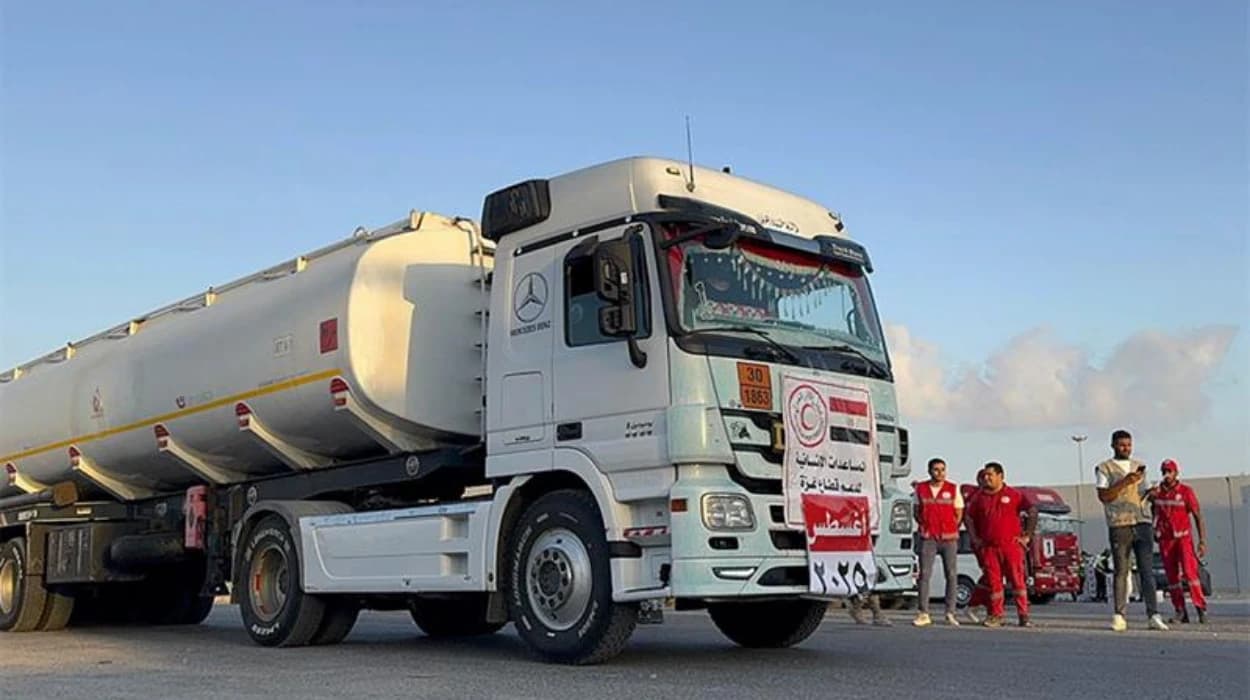Egypt dispatched its 12th humanitarian aid convoy to the
Gaza Strip, carrying hundreds of tons of food, water, medical supplies, and
fuel as part of ongoing efforts to alleviate the catastrophic humanitarian
crisis caused by a prolonged Israeli blockade. The convoy includes food
staples, baby formula, and three fuel trucks, adding to previous deliveries,
while parallel military airdrops have also been conducted to inaccessible areas
in Gaza.
Egypt's Continued Support for Gaza Amid Crisis
On Monday, August 11, 2025, Egypt launched its 12th aid
convoy heading to the Gaza Strip through the Karm Abu Salem crossing, loaded
with vital relief materials to help the area’s stricken population. As reported
by Ahram Online, the convoy comprised hundreds of tons of food items including
canned meals, legumes, essential medicines, water, infant formula, and
crucially, three trucks loaded with fuel supplies. These trucks add to five
fuel tankers sent since the previous Sunday, making a total of eight fuel
deliveries within a week, an essential step to power Gaza’s hospitals and
bakeries.
The Karm Abu Salem crossing operates between 8 am and 5 pm,
where each truck undergoes a detailed inspection before being allowed entry
into Gaza. Once cleared, the aid is handed over to trusted humanitarian
organisations such as the Palestinian Red Crescent and various United Nations
agencies for distribution within the territory.
Scale and Impact of the Aid Deliveries
This 12th convoy marks another significant milestone in
Egypt’s near-weekly dispatches of land convoys since Israel’s “tactical pause”
allowing limited humanitarian aid entry after five months of near-total
blockade of Gaza. This blockade led to severe shortages of food, water, and
medicine, resulting in an almost catastrophic famine within the Gaza Strip,
home to some 2.3 million people. The initial Egyptian aid convoy under the
"Zad Al-Ezza" humanitarian initiative was sent on 27 July 2025 after
months of imposed restrictions.
The Egyptian Red Crescent’s Executive Director, Amal Imam,
highlighted Egypt’s commitment, disclosing that since October 2023, Egypt has
sent approximately 36,000 trucks carrying more than 500,000 tons of food,
medical, and relief supplies to Gaza. The aid includes items such as flour,
personal care goods, infant formulas, freshly baked bread, hot meals, and
urgent medical provisions.
Aerial Assistance and Parallel Efforts
In addition to land convoys, the Egyptian military has conducted
airdrops of food to isolated and otherwise inaccessible areas within Gaza.
Twelve Egyptian military transport aircraft airdropped tons of food supplies
over Gaza in the past days, according to an official military statement
reported by Ahram Online on August 6, 2025. This aerial operation is designed
to counter severe shortages resulting from the longer ground transport delays
occasioned by border controls and security inspections.
President Abdel-Fattah El-Sisi ordered the continuation of
these efforts, stressing Egypt’s resolve to alleviate the dire humanitarian
situation in Gaza, where the blockade led to a humanitarian crisis described by
the United Nations as involving widespread food insecurity and a
"worst-case scenario of famine".
Humanitarian Challenges and Political Context
Delivering aid within Gaza remains a complex and perilous
operation. After months of complete Israeli blockade, the humanitarian
situation deteriorated sharply, with Palestinian health officials attributing
212 civilian deaths, including half children, to famine-related causes. Israeli
military policies have been accused of systematic starvation and blockade,
severely impacting Gaza's population. According to the UN, the full population
of Gaza now faces critical food insecurity.
Egypt’s Foreign Minister Badr Abdelatty communicated Egypt's
categorical rejection of Israel’s plans to expand military operations in Gaza,
which he described as extremely dangerous and likely to exacerbate the
catastrophic humanitarian situation. During a phone call with his German
counterpart Johann Wadephul on August 10, Abdelatty condemned Israel’s blockade
and called on European partners to act swiftly to prevent further escalation.
Aid Delivery Operations Amid Difficulties
The Rafah crossing, the main gateway for Egyptian aid into
Gaza, remains a focal point of logistics but also political tension. Despite
Egyptian trucks lining up to enter, Israeli forces control the adjacent Kerem
Shalom crossing where goods undergo inspection. The aid convoys have faced
partial entry limitations, with many trucks waiting for clearance; around 800
trucks have entered since late July, with thousands queued for inspection.
The international community, including humanitarian
organisations, has repeatedly called for the full and sustained opening of land
crossings for aid delivery, warning that current shipments and airdrops are
insufficient for the needs of Gaza’s population.
Summary of Egyptian Aid Initiatives
- Since
July 27, several convoys have entered Gaza, with the 12th convoy sending
large quantities of food, medical supplies, infant formula, and fuel.
- Three
fuel trucks entered with this 12th convoy, essential for restarting
hospitals and bakeries.
- Egyptian
military aircraft have carried out airdrops of food to inaccessible
locations to complement land aid deliveries.
- Egypt
has sent approximately 36,000 trucks carrying over 500,000 tons of aid
since October 2023.
- Aid
is coordinated mainly through the Egyptian Red Crescent in partnership
with UN agencies and the Palestinian Red Crescent.
- Egypt
continues to engage diplomatically to support Gaza, condemning Israeli
military escalations and blockades.
